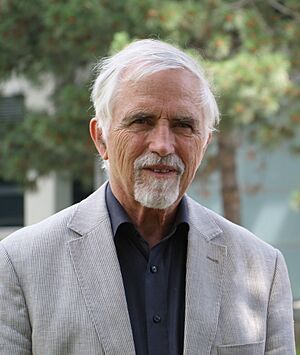Rudolf Wille facts for kids
Rudolf Wille (born November 2, 1937 – died January 22, 2017) was a German mathematician. He was a professor of General Algebra at Technische Universität Darmstadt (TU Darmstadt) from 1970 to 2003. He is best known for creating formal concept analysis, a special way to organize information using math.
Rudolf Wille was also a talented musician. He used his math skills to study music, teach math, and explore the philosophy of science. He was a big leader in the research community that studied concept lattices, which are like maps for organizing ideas.
Wille was part of the Institute for Philosophy at TU Darmstadt starting in 1976. From 1983, he led a research group focused on Formal concept analysis. Later, in 1993, he became the head of the "Ernst Schröder Center for Conceptual Knowledge Engineering." He also helped start the Center for Inter-Disciplinary Research in Darmstadt and worked with other research groups around the world.
What Rudolf Wille Studied
Rudolf Wille was interested in many different areas of math and science. Some of his main interests included:
- Algebra (the study of mathematical symbols and rules)
- Lattice theory (a way to organize things based on their relationships)
- Geometry (the study of shapes and spaces)
- Discrete mathematics (math that deals with separate, distinct values)
- Measurement theory (how we measure things)
- Math in music
- Philosophy of science (how science works and what it means)
- Conceptual knowledge engineering (designing systems to manage ideas)
- Contextual logic (a type of logic that considers the situation)
His Important Work
Rudolf Wille wrote more than 250 scientific papers. He also co-wrote a very important textbook about Formal concept analysis with his long-time friend and former student, Bernhard Ganter. This book is widely used by researchers.
- B. Ganter, R. Wille (1999) Formal Concept Analysis: Mathematical Foundations, Springer-Verlag, ISBN: 3540278915.
Helping Other Scientists
Rudolf Wille was a great leader and mentor. He helped many students and researchers. He guided over 100 German "Diplom- und Staatsexamenarbeiten" (like master's theses) in Mathematics. He also supervised 51 PhD students and helped 8 researchers get their "habilitation" qualifications, which are needed to become a professor in Germany.
Many researchers around the world continue to study Rudolf Wille's work on Formal concept analysis. There are several big conferences where they share their ideas:
- The International Conferences on Formal Concept Analysis (ICFCA)
- Conceptual Structures (see also Conceptual graphs) (ICCS)
- Concept Lattices and their Application (CLA) conferences
The papers from the first two conferences are published in the Lecture Notes in Computer Science. The CLA conference is a multi-stage event that leads to journal papers.
See also
 In Spanish: Rudolf Wille para niños
In Spanish: Rudolf Wille para niños


